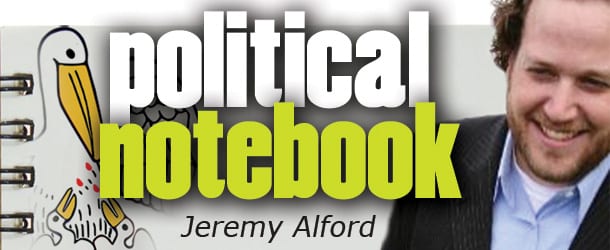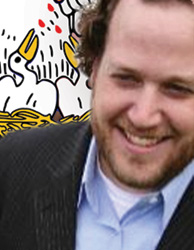Virginia-based media company Borrell Associates has released a report forecasting that political advertising in 2016 will eclipse $11.4 billion nationally. This is 20 percent higher than the total of the last presidential cycle in 2012.
That works out to an average of $50.75 for each eligible voter.
In Louisiana, where there are 2.8 million registered voters, Borrell expects $22.3 million will be spent by those involved in the presidential race.
The 2016 U.S. Senate race in Louisiana should produce another $9.4 million worth of political advertising and our U.S. House seats will be the target of $3.6 million in ads.
The decrease in political advertising on broadcast television will be “breathtaking,” according to the report, with the backlash from over-exposed politicians beginning in 2017 and spending dipping below 2009 levels. But for 2016, it still leads all other categories.
“Broadcast TV is likely to continue to lose political ad share, and perhaps even show, for the first time since the birth of television, a decline in political advertising dollars,” the report states. “Newspaper spending will also likely see a decline. We foresee most large metro papers ceasing daily publication within the next two to three years, shifting to three days per week. The majority of the nation’s 20,000 papers, however, continue to serve their towns and smaller cities with little change and should be viable venues for local campaign ads.”
As for the Internet, the report suggests that by next year, social media sites will absorb more than half of all online political ad spending.
When coupled with any local races that might be competitive in 2016, as well as special interests and ballot initiatives, Borrell Associates predicts $31.33 will be spent in Louisiana on political advertising per eligible voter next year.
Self-Financing Becomes A Trend
It’s not unheard of to have a self-financed candidate in a major Louisiana campaign. But to see seven statewide candidates, including one incumbent and a regional officeholder, dipping into their own pockets during the same reporting period is somewhat unusual.
An aggressive U.S. Senate race last year and competition with hundreds of other races this cycle has clearly taken its toll. Mix in super PACs, which are political action committees that can raise unlimited amounts of money, and special interests that are playing in the elections, and you start to understand why cash has been so hard to come by.
In all, statewide candidates for office in Louisiana loaned themselves more than $1.3 million during the most recently completed fundraising quarter.
In the race for governor, Public Service Commissioner Scott Angelle loaned his campaign $122,000 in July and took out a $253,000 loan with FM Bank in Breaux Bridge. The Republican’s campaign would not have reached $1 million in cash on hand at the end of the most recent quarter without the loans.
In the race for lieutenant governor, former Plaquemines Parish President Billy Nungesser loaned his campaign $500,000 in July. How long it will stay in the account is a good question. Nungesser loaned his campaign $900,000 on Dec. 31, just in time to bolster his first annual report. He repaid it in full on Jan. 6.
Three of the candidates for attorney general, including the incumbent, dug into their own pockets. GOP Attorney General Buddy Caldwell put up $200,000. Former Congressman Jeff Landry of New Iberia topped that with a $250,000 July loan, and West Baton Rouge Parish prosecutor Marty Maley inserted $3,000 into his campaign.
In the secretary of state’s race, challenger and law professor Chris Tyson of Baton Rouge loaned himself $10,000. Matt Parker of Monroe, who is running for insurance commissioner, also took out a $1,200 loan for his campaign.
Lobbying Laws Get Passing Grade
Despite the negative perceptions some have of lobbyists, those plying their trade in the Bayou State are publicly reporting what they spend and are doing so at a threshold that’s well above the national average.
Louisiana is among 15 states that received a grade of B for its disclosure of lobbyist activity and compensation, according to a new report issued by the nonpartisan Sunlight Foundation. Only seven states received an A.
While the Louisiana Ethics Administration has a searchable database of registered lobbyists, there are still six states that withhold registration from the public, the report found. And there are 33 states where lobbyists are not mandated to disclose their expenditures. Louisiana is not among them.
The report does recommend that Louisiana could begin forcing lobbyists to reveal which specific pieces of legislation they are seeking to influence. For some working lobbyists following a regular session of the Legislature, such a report would make for a lengthy read.
Overall, Louisiana received a score of three points in five different categories, placing it in the higher bracket of states that received a “B” grade. The report is available in full on the Sunlight Foundation’s website.
Qualifying Dates Create Problems
There are only 44 days between the close of qualifying on Sept. 10 and the primary election on Oct. 24. That’s a little over six weeks to run a professional campaign in a period when the voters know the names of the full field of candidates.
Folks who make a living off politics are being driven crazy by that timeframe. Campaign managers are sitting on direct mail pieces, waiting to find out whom they will attack. Political action committees are sitting on checks, holding out to see if they have the right horse — and the right amount. Special interests have paused their endorsement processes.
All of this is happening because Louisiana has a late election cycle and an equally late qualifying period.
However, there is good news. Act 410 by Rep. Chris Broadwater, R-Hammond, goes into effect on Jan. 1, 2016. It will create more wiggle room for candidates and their campaigns.
So in 2019, this same slate of elections will be moved up, from the second-to-last Saturday in October to the third-to-last. Qualifying will move up one month, from September to August, beginning on the first Tuesday following the first Monday of the month.
For next year’s congressional races, qualifying will be in July, rather than in August, on the third Wednesday of the month.
Candidates Talk About Lt. Gov.
LaPolitics asked all four of the major gubernatorial candidates what role the next lieutenant governor would play in their administration if they were elected.
They were also asked if they prefer one of the candidates over the others. But none voiced a preference or were willing to announce an endorsement.
Only Lt. Gov. Jay Dardenne said outright he would not give the next lieutenant governor any additional responsibilities. “No, because if he does as I have done, which is to serve as secretary of the Dept. of Culture, Recreation and Tourism, instead of filling that position, he will be very busy,” Dardenne said. “Doing that job myself instead of hiring a CRT secretary saved the taxpayers $130,000 a year.”
Public Service Commissioner Scott Angelle served as lieutenant governor as well, on an interim basis. “Any additional responsibilities that I would provide to the lieutenant governor would stem from a partnership between us,” said Angelle.
U.S. Sen. David Vitter said he would meet with the new lieutenant governor soon after being elected. State Rep. John Bel Edwards said he would have an open line of communications too.
Groups Poised For BESE Races
The elections for the Board of Elementary and Secondary Education around the state could become expensive if the slate of so-called reform candidates from 2011 face serious challenges this go-around.
The Louisiana Assoc. of Business and Industry estimates that 47 percent of its total election budget, which stands today at $675,000, but will grow, will be dedicated to BESE races only.
“We spent around $305,000 in 2011 and it’s looking like we’ll reach that level again soon for the current BESE races,” said Brian Landry, LABI vice president of political action.
At stake are the reform seats secured last cycle and the eight-vote bloc needed to keep, or remove, Education Superintendent John White next term. The reform group on the 11-member board has overhauled teacher tenure, boosted charters and championed private school vouchers.
Gov. Bobby Jindal and the Louisiana Republican Party played a big role in underwriting the election of those reform members in 2011. But Common Core, which the reform members and White (in favor) and Jindal (against) split on, has also splintered the party, and now neither are playing in the races.
“We haven’t endorsed anyone in the races, and most are Republican versus Republican. So, as of now, no,” said state GOP executive director Jason Doré when asked whether the party would get involved.
So who is picking up the slack? In addition to LABI, there’s the Alliance for Better Classrooms PAC, organized by businessman Lane Grigsby and directed by Dan Juneau, LABI’s former president. Juneau said he’ll have a better handle on just how active the races will be after qualifying, but he expects ABC to raise money in the high six figures, or maybe even the low seven figures.
Empower Louisiana, whose board Grigsby sits on, may be the only super PAC in the field on the pro-reform side. While union groups from outside Louisiana aren’t showing much interest, opting instead to attack on the school board level, several national groups with Louisiana affiliates will be fighting for the reform candidates, including the pro-charter Stand For Children; Federation For Children (which has businessman Eddie Rispon); Democrats For Education Reform; and Black Alliance For Educational Options. The Louisiana Assoc. of Public Charter Schools, run by Carline Roemer Shirley, is part of this coalition.
On the other side of the fence, so far, is only FlipBESE, which has been loosely organized by anti-Common Core parents. It has its own slate of candidates opposing the so-called reform campaign and they’re being promoted primarily on a Facebook page. “There is no money involved in this whatsoever from our side,” said spokesperson Amy Lemoine of Lafayette. “We want a board not tied to out-of-state special interests and candidates who realize the current education agenda is inadequate. We want a board that will get rid of John White. We want him gone.”
Another player to watch for is the Network for Public Education, which was founded by activist and education historian Diane Ravitch of New York. The advocacy group, which opposes corporation-backed school reforms, has started making endorsements in the state.
Baldone To Appeal Ruling
District Judge David W. Arceneaux ruled that a candidate running in state House District 52 will not be allowed to appear on the Oct. 24 ballot as both a Republican and a Democrat.
Former state Rep. Damon Baldone of Houma was pursuing the dual registration because he felt his constitutional rights were violated when the Terrebonne Parish registrar of voters forced him to register as “other.” He had originally attempted to register with both mainline parties simultaneously.
Baldone, who was a Democrat before switching his registration, said he still hopes to become Louisiana’s first hybrid party candidate. “I’ll be appealing the ruling,” he said.
Citing case law, Arceneaux ruled that “the state had a strong and legitimate interest in minimizing ballot-engendered voter confusion or deception generally.”
Baldone said his goal is not to confuse, but to head off the splintering of the Louisiana Legislature along party lines. He said he wanted the opportunity to be able to work with both parties and the ability to attend caucus meetings for Democrats and Republicans, although it isn’t clear whether either party would permit such a crossover.
Baldone is running to replace House Natural Resources Chairman Gordy Dove, R-Houma, who is term-limited. Also expected to qualify in the race are two Republicans, Jerome Zeringue, former coastal aide for Gov. Bobby Jindal, and J.J. Buquet, who owns Buquet Distributing in Houma.
For more Louisiana political news, visit www.LaPolitics.com or follow Jeremy Alford on Twitter @LaPoliticsNow.














Comments are closed.